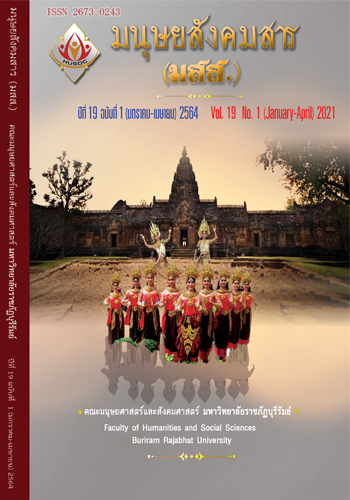ผลการจัดการเรียนรู้เรื่อง โจทย์ปัญหาระคน โดยใช้การเรียนรู้เทคนิค การจัดกลุ่มแบบรายบุคคลร่วมกับกระบวนการแก้ปัญหาของโพลยา ที่มีต่อผลสัมฤทธิ์ทางการเรียนและความสามารถในการคิดแก้ปัญหา ของนักเรียนชั้นประถมศึกษาปีที่ 3
Main Article Content
บทคัดย่อ
การวิจัยครั้งนี้มีวัตถุประสงค์ 1) เพื่อเปรียบเทียบผลสัมฤทธิ์ทางการเรียนของนักเรียนระหว่างก่อนเรียนและหลังเรียน 2) เพื่อเปรียบเทียบความสามารถในการคิดแก้ปัญหาของนักเรียนระหว่างก่อนเรียนและหลังเรียน และ 3) เพื่อศึกษาความพึงพอใจของนักเรียนที่มีต่อการจัดการเรียนรู้ กลุ่มตัวอย่างที่ใช้ในการวิจัยครั้งนี้เป็นนักเรียนชั้นประถมศึกษาปีที่ 3/2 จำนวน 32 คน โรงเรียนบ้านหนองหินโคน ได้มาด้วยวิธีการสุ่มแบบกลุ่ม เครื่องมือที่ใช้ในการวิจัย ได้แก่ แผนการจัดการเรียนรู้ จำนวน 7 แผน แบบทดสอบวัดผลสัมฤทธิ์ทางการเรียน แบบปรนัยชนิดเลือกตอบ 4 ตัวเลือก จำนวน 20 ข้อ มีค่าความเชื่อมั่นทั้งฉบับ เท่ากับ 0.89 แบบทดสอบกระบวนการคิดแก้ปัญหา แบบอัตนัย จำนวน 5 ข้อ มีค่าความเชื่อมั่นทั้งฉบับ เท่ากับ 0.87 แบบสอบถามความพึงพอใจของนักเรียน ซึ่งเป็นแบบมาตราส่วนประมาณค่า 3 ระดับ จำนวน 10 ข้อ ผลการวิจัย สรุปได้ว่า 1) ผลสัมฤทธิ์ทางการเรียนของนักเรียนหลังเรียนด้วยการจัดการเรียนรู้ เรื่อง โจทย์ปัญหาระคน โดยใช้การเรียนรู้เทคนิคการจัดกลุ่มแบบรายบุคคล ร่วมกับกระบวนการแก้ปัญหาของโพลยาสำหรับนักเรียนชั้นประถมศึกษาปีที่ 3 สูงกว่าก่อนเรียน อย่างมีนัยสำคัญทางสถิติที่ระดับ .05 2) ความสามารถด้านการคิดแก้ปัญหาของนักเรียนหลังเรียนสูงกว่าก่อนเรียน อย่างมีนัยสำคัญทางสถิติที่ระดับ .05 และ 3) ความพึงพอใจของนักเรียนที่มีต่อการจัดการเรียนรู้ โดยรวมอยู่ในระดับมากที่สุด
Article Details

อนุญาตภายใต้เงื่อนไข Creative Commons Attribution-NonCommercial 4.0 International License.
เนื้อหาและข้อมูลในบทความที่ลงตีพิมพ์ในวารสารทดสอบระบบ ThaiJo2 ถือเป็นข้อคิดเห็นและความรับผิดชอบของผู้เขียนบทความโดยตรงซึ่งกองบรรณาธิการวารสาร ไม่จำเป็นต้องเห็นด้วย หรือร่วมรับผิดชอบใดๆ
บทความ ข้อมูล เนื้อหา รูปภาพ ฯลฯ ที่ได้รับการตีพิมพ์ในวารสารทดสอบระบบ ThaiJo2 ถือเป็นลิขสิทธิ์ของวารสารทดสอบระบบ ThaiJo2 หากบุคคลหรือหน่วยงานใดต้องการนำทั้งหมดหรือส่วนหนึ่งส่วนใดไปเผยแพร่ต่อหรือเพื่อกระทำการใดๆ จะต้องได้รับอนุญาตเป็นลายลักอักษรจากวารสารทดสอบระบบ ThaiJo2 ก่อนเท่านั้น
เอกสารอ้างอิง
Academic Department Nonghinkhon School. (2019). Self – assessment report 2019. Nakhon Ratchasima: Nonghinkhon School. [in Thai]
Brabato, R.A. (2000). “Policy implications of cooperative learning on the achievement and attitudes of secondary school mathematic student”. Dissertation Abstracts International. 61(06). 2113 – A.
Chairit, A. (2016). A development of learning activity by using polya’s problem solving approach cooperative with team assisted individualization technique for promoting learning achievement, problem solving ability and attitude towards mathematics learning activities of prathomsuksa 5 students. Master of Education Thesis (Curriculum and Instruction). Mahasarakham: Graduate School of Mahasarakham University. [in Thai]
Deemuang, C. (2013). The development of worksheet kids on mathematical problem solving skills in addition and subtraction of grade3 student. Master of Education Thesis (Curriculum and Learning Management). Pathum Thani: Graduate School of Rangsit University. [in Thai]
Khemmani, T. (2005). Science of teaching pedagogy. Bangkok: Chulalongkorn University. [in Thai]
Khaengrit, A. (2015). Effects of mathematics skill exercises using tai cooperative learning for matthayomsuksa 1 students. Master of Education Thesis (Curriculum and Instrution). Buriram: Graduate School of Buriram Rajabhat University. [in Thai]
Klankuwat, N. (2016). The effects of team assisted individualization with Polya problem solving process on mathematical problem solving and mathematics learning achievement on words problem of linear equation one variable of mathayomsuksa 2 students. Master of Education Thesis (Mathematics Teaching). Chon Buri: Graduate School of Burapha University. [in Thai]
Ministry of Education. (2017). Education development plan of the ministry of education no. 12 (2017-2021). Bangkok: Office of Policy and Strategy. Office of the Permanent Secretary for Education Ministry of Education. [in Thai]
Nakkasen, A. (2013). The effects of lt cooperative earning management supplemented with polya’s problem solving process and skill practice on mathematical problem solving abilities of mathayomsuksa 2 students. Master of Education Thesis (Curriculum and Learning Management). Udon Thani: Graduate School of Udon Thani Rajabhat University. [in Thai]
Noiplee, S. (2016). Effect of employing skill exercises entitled ratio and percentage with tai cooperative learning technique for matthayomsuksa 2 students. Master of Education Thesis (Curriculum and Learning Management). Buriram: Graduate School of Buriram Rajabhat University. [in Thai]
Polya, G. (1957). How to solve it. New York: Doubleday & Company.
Putt, I.J. (1979). “An exploratory investigation of two methods of instruction in mathematics problems solving ability at the fifth grade level”. Dissertation Abstracts International, 39(4), 5382-A.
Phattiyathanee, S. (2012). Graduation measure. Bangkok: Prasan Printing. [in Thai]
Pumas, N. (2016). Development of skill practice exercises on equations and solving equations of mathematics cooperative learning strand for prathomsuksa 6 students by using tai technique. Master of Education Thesis (Curriculum and Learning Management). Buriram: Graduate School of Buriram Rajabhat University. [in Thai]
Slavin, R.E. (1984). “Effects of team assisted Individualization on the mathematics achievement of academically handicapped and nonhandicapped student”. Journal of Educational Psychology, 76(5), 813.
Slavin, R.E. (1990). Cooperative learning: Theory, research and practice. New Jersey: Prentice – H.
Thipkhong, S. (2002). Curriculum and teaching mathematics. Bangkok: Institute of Academic Development. [in Thai]
Weir, J. J. (1974). “Problem is everybody’s problem”. The Science Teacher, 41(4), 16-18.


